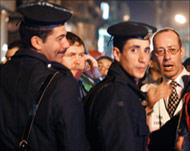Egypt on edge after fatal bazaar blast
Security is tighter than ever around Egypt’s main tourist sites, one day after a bomb in Cairo’s old bazaar killed two tourists and raised the spectre of a fresh wave of attacks.

Thursday’s blast, apparently caused by a booby-trapped motorcycle, was the first attack against foreigners in the capital in more than seven years and came amid unprecedented upheaval on Egypt’s political scene.
Egyptian Tourism Minister Ahmad al-Maghrabi said a Frenchwoman and a US national had been killed in the blast, while the third victim had not yet been identified.
He said three Americans, two French and four Egyptians were being treated at the hospital. One of the French nationals was in a serious condition while the other wounded were stable, he added.
No claim
There was no immediate claim of responsibility for the blast, but the authorities swiftly launched an investigation and tightened security around the country’s main tourist attractions.
The US authorities warned their citizens to avoid tourist hubs in the capital pending further information on the nature of the explosion.
 |
|
The blast struck in the heart of |
“While there is no independent information to suggest that this alleged attack was a part of a larger effort, all residents of and visitors to Egypt should be especially vigilant and avoid areas of Cairo where large numbers of tourists congregate,” a US embassy statement said.
The Egyptian authorities attempted to play down the blast. “According to preliminary information, it was an individual operation, its perpetrator having used a home-made device consisting of powder and nails,” said government spokesman Majdi Radi.
The blast struck one of the main alleyways to the famed Khan al-Khalili bazaar, which is in the heart of ancient Islamic Cairo and is popular with souvenir-hunting tourists.
“I saw a man burning, his galabaya (traditional dress) was on fire, his back was badly burnt as he lay on the ground,” an eyewitness said shortly after the blast.
The explosion plunged the district into darkness and the usually bustling streets of the famed market were soon deserted, as tourists fled the area and shop owners hastily shut down their stalls.
Few tourists around
On Friday, tourists were scarce in the Khan al-Khalili area and security heavily deployed around the nearby al-Azhar mosque. “Our immediate concern is to take the appropriate measures and help those who have been affected by the explosion, but we should not be intimidated,” al-Maghrabi said.
He said the rest of the French group that suffered casualties in the explosion had continued its tour with a visit to the Saqqara pyramids just outside Cairo and was due to travel to Upper Egypt later on Friday.
|
“There is no indication for the moment that people are cancelling their trips to Egypt” |
“There is no indication for the moment that people are cancelling their trips to Egypt,” the tourism minister added.
Egypt is a popular destination for tourists because of its Pharaonic monuments, Nile cruises and the Red Sea coast.
The Egyptian economy is heavily dependent on tourism and has been severely hit by previous attacks.
In October, 34 people, including several Israeli tourists, were killed and more than 10 wounded in triple bomb attacks on the Hilton hotel in Taba and two nearby resorts in the Sinai peninsula.
The Sinai bombings were the first such attacks against foreigners in Egypt since a wave of deadly bombings in the mid-nineties.
Foiled attacks
According to police sources, the authorities had foiled a series of attacks against foreigners in the Khan al-Khalili bazaar allegedly masterminded by the Islamic Jihad group.
One of the former group’s leaders at the time was Egyptian Ayman al-Zawahiri, now al-Qaida chief Usama bin Ladin’s right-hand man.
The fresh unrest in the capital comes amid moves by the opposition to Egyptian President Husni Mubarak’s rule over the country and growing calls for lifting the 24-year-old state of emergency.
Mufti Ali Jumaa, Egypt’s highest religious authority, condemned the attack and said in a statement that “it could only serve the purpose of those who are jealous of the country’s stability”.